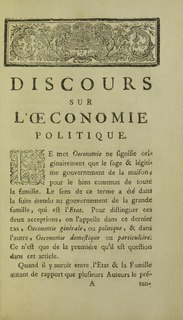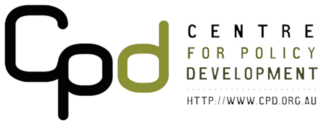Related Research Articles

Political economy is the study of production and trade and their relations with law, custom and government; and with the distribution of national income and wealth. As a discipline, political economy originated in moral philosophy, in the 18th century, to explore the administration of states' wealth, with "political" signifying the Greek word polity and "economy" signifying the Greek word "okonomie". The earliest works of political economy are usually attributed to the British scholars Adam Smith, Thomas Malthus, and David Ricardo, although they were preceded by the work of the French physiocrats, such as François Quesnay (1694–1774) and Anne-Robert-Jacques Turgot (1727–1781).

Social justice is a concept of fair and just relations between the individual and society, as measured by the distribution of wealth, opportunities for personal activity, and social privileges. In Western as well as in older Asian cultures, the concept of social justice has often referred to the process of ensuring that individuals fulfill their societal roles and receive what was their due from society. In the current global grassroots movements for social justice, the emphasis has been on the breaking of barriers for social mobility, the creation of safety nets and economic justice.
Development communication refers to the use of communication to facilitate social development. Development communication engages stakeholders and policy makers, establishes conducive environments, assesses risks and opportunities and promotes information exchanges to create positive social change via sustainable development. Development communication techniques include information dissemination and education, behavior change, social marketing, social mobilization, media advocacy, communication for social change, and community participation.

Public administration is the implementation of government policy and also an academic discipline that studies this implementation and prepares civil servants for working in the public service. As a "field of inquiry with a diverse scope" whose fundamental goal is to "advance management and policies so that government can function". Some of the various definitions which have been offered for the term are: "the management of public programs"; the "translation of politics into the reality that citizens see every day"; and "the study of government decision making, the analysis of the policies themselves, the various inputs that have produced them, and the inputs necessary to produce alternative policies."
The social market economy, also called Rhine capitalism, is a socioeconomic model combining a free market capitalist economic system alongside social policies that establish both fair competition within the market and a welfare state. It is sometimes classified as a coordinated market economy. The social market economy was originally promoted and implemented in West Germany by the Christian Democratic Union (CDU) under Chancellor Konrad Adenauer in 1949. Its origins can be traced to the interwar Freiburg school of economic thought.
Policy analysis is a technique used in public administration to enable civil servants, activists, and others to examine and evaluate the available options to implement the goals of laws and elected officials. The process is also used in the administration of large organizations with complex policies. It has been defined as the process of "determining which of various policies will achieve a given set of goals in light of the relations between the policies and the goals."
Governance comprises all of the processes of governing – whether undertaken by the government of a state, by a market or by a network – over a social system and whether through the laws, norms, power or language of an organized society. It relates to "the processes of interaction and decision-making among the actors involved in a collective problem that lead to the creation, reinforcement, or reproduction of social norms and institutions". In lay terms, it could be described as the political processes that exist in and between formal institutions.

Laurence Jacob Kotlikoff is an American academic and politician, who is a William Warren Fairfield Professor at Boston University. Apart from being an economics professor at Boston University, he is also a Fellow of the American Academy of Arts and Sciences, a Research Associate of the National Bureau of Economic Research, a Fellow of the Econometric Society, a former Senior Economist, and was formerly on President Ronald Reagan's Council of Economic Advisers. Kotlikoff ran, as he did in the previous elections, as a write-in candidate for President of the United States in the November 8, 2016 election.

Intergenerational equity in economic, psychological, and sociological contexts, is the concept or idea of fairness or justice between generations. The concept can be applied to fairness in dynamics between children, youth, adults and seniors, in terms of treatment and interactions. It can also be applied to fairness between generations currently living and generations yet to be born.
The societal marketing is a marketing concept that holds that a company should make marketing decisions not only by considering consumers' wants, the company's requirements, but also society's long-term interests.
Conservation psychology is the scientific study of the reciprocal relationships between humans and the rest of nature, with a particular focus on how to encourage conservation of the natural world. Rather than a specialty area within psychology itself, it is a growing field for scientists, researchers, and practitioners of all disciplines to come together and better understand the earth and what can be done to preserve it. This network seeks to understand why humans hurt or help the environment and what can be done to change such behavior. The term "conservation psychology" refers to any fields of psychology that have understandable knowledge about the environment and the effects humans have on the natural world. Conservation psychologists use their abilities in "greening" psychology and make society ecologically sustainable. The science of conservation psychology is oriented toward environmental sustainability, which includes concerns like the conservation of resources, conservation of ecosystems, and quality of life issues for humans and other species.
Anti-oppressive practice is an interdisciplinary approach primarily rooted within the practice of social work that focuses on ending socioeconomic oppression. It requires the practitioner to critically examine the power imbalance inherent in an organizational structure with regards to the larger sociocultural and political context in order to develop strategies for creating an egalitarian environment free from oppression, racism, and other forms of discrimination in the larger society, by engaging at the legal and political level. In general community practice it is about responding to oppression by dominant groups and individuals. In social services it regulates any possible oppressive practices and helps in delivering welfare services in an inclusive manner.

Centre for Policy Development is a leading independent public policy think tank. It was established in 2007 as an institute for long-term policy development, in an effort to counteract the focus on short-term fixes and political gains in Australian policy making. Its motto is to embrace ‘the long-term now’. CPD offers rigorous solutions to long-term challenges. In doing so, CPD seeks to change the nature of policy discussion and drive better public policy for Australia’s future.
Intergenerationality is interaction between members of different generations. Sociologists study many intergenerational issues, including equity, conflict, and mobility.

Environmental social science is the broad, transdisciplinary study of interrelations between humans and the natural environment. Environmental social scientists work within and between the fields of anthropology, communication studies, economics, geography, history, political science, psychology, and sociology; and also in the interdisciplinary fields of environmental studies, human ecology and political ecology, social epidemiology, among others.
Equity may refer to:
Collaborative partnerships are agreements and actions made by consenting organizations to share resources to accomplish a mutual goal. Collaborative partnerships rely on participation by at least two parties who agree to share resources, such as finances, knowledge, and people. Organizations in a collaborative partnership share common goals. The essence of collaborative partnership is for all parties to mutually benefit from working together.
Policy network analysis is a field of research in political science focusing on the links and interdependence between government's sections and other societal actors, aiming to understand the policy-making process and public policy outcomes.
Silver economy is the system of production, distribution and consumption of goods and services aimed at using the purchasing potential of older and ageing people and satisfying their consumption, living and health needs. The silver economy is analyzed in the field of social gerontology not as existing economic system but as an instrument of ageing policy and the political idea of forming a potential, needs-oriented economic system for aging population. Its main element is gerontechnology as a new scientific, research and implementation paradigm.
References
- ↑ Generations United. (2010) "Guiding Principles Archived 2008-08-20 at the Wayback Machine "
- ↑ Klimczuk, Andrzej, Intergenerationality, Intergenerational Justice, Intergenerational Policies, [in:] S. Thompson (ed.), Encyclopedia of Diversity and Social Justice, Rowman & Littlefield, Lanham 2015, pp. 419-423; Lüscher, Kurt, Hoff, Andreas, Klimczuk, Andrzej, Lamura, Giovanni, Renzi, Marta, Oliveira, Paulo d.S., Sánchez, Mariano, Viry, Gil, Widmer, Eric, Neményi, Ágnes, Veress, Enikő, Bjursell, Cecilia, Boström, Ann-Kristin, Rapolienė, Gražina, Mikulionienė, Sarmitė, Oğlak, Sema, Canatan, Ayşe, Vujović, Ana, Svetelšek, Ajda, Gavranović, Nedim, Ivashchenko, Olga, Shipovskaya, Valentina, Lin, Qing, Wang, Xiying, Generations, intergenerational relationships, generational policy. A multilingual compendium - Edition 2017 , Universität Konstanz, Konstanz 2017;
- ↑ Klimczuk, Andrzej, Analysis of Intergenerational Policy Models , "Ad Alta: Journal of Interdisciplinary Research" 1/2013, pp. 66-69.
| This government-related article is a stub. You can help Wikipedia by expanding it. |